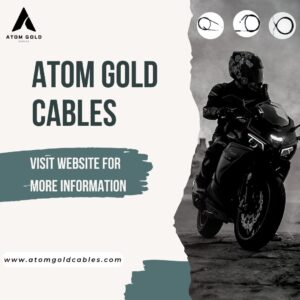In the fast-evolving automotive industry, technological advancements continue to shape every component of a vehicle. One often-overlooked yet essential component is the automotive cable. These cables, responsible for transmitting power, data, and signals throughout the vehicle, require robust insulation materials to ensure reliability and safety. Insulation plays a critical role in protecting these cables from harsh environments, high temperatures, chemicals, and physical stress. With new demands in electric vehicles (EVs) and the need for enhanced performance, insulation materials are now more advanced than ever. This article explores the latest innovations in insulation materials for automotive cables and their impact on the industry.

The Importance of Insulation in Automotive Cables
Automotive cables are exposed to a variety of challenges, including extreme temperatures, high voltage, vibrations, moisture, and exposure to chemicals. Insulation materials act as a protective barrier around the conductive wire, ensuring that the cable remains functional in challenging environments. Without proper insulation, cables could suffer from degradation, short-circuiting, and signal interference, compromising vehicle performance and safety.
Quality insulation materials are therefore essential in automotive cables for several reasons:
- Thermal Stability: Insulation prevents cables from overheating, ensuring they can function safely at high temperatures.
- Chemical Resistance: Automotive environments expose cables to various chemicals, making insulation critical to protect against corrosion.
- Mechanical Durability: Insulation shields cables from physical damage caused by vibrations and impact.
- Electrical Isolation: Insulation prevents short circuits and signal interference, which are essential for both safety and vehicle performance.
Key Innovations in Insulation Materials for Automotive Cables
Over the years, insulation materials for automotive cables have advanced significantly, driven by the rise of electric vehicles, connected car technologies, and increased regulatory standards. The following are some of the key innovations in automotive cable insulation:
1. High-Temperature Thermoplastics
High-temperature thermoplastics, such as polyvinyl chloride (PVC), polyethylene (PE), and polyphenylene sulfide (PPS), have become popular insulation materials due to their durability and resistance to heat. These materials can withstand high temperatures without deforming or melting, which is essential in areas near engines and exhaust systems where temperatures are extreme.
Polyethylene, for example, is known for its excellent thermal stability and mechanical strength. It is widely used in automotive cables because it can resist high temperatures and maintain flexibility. Polyphenylene sulfide (PPS), on the other hand, is used in applications where even higher temperatures are present. It can handle prolonged exposure to temperatures over 200°C, making it ideal for critical engine compartments.
2. Cross-Linked Polyethylene (XLPE)
Cross-linked polyethylene, or XLPE, has revolutionized automotive cable insulation with its superior thermal and mechanical properties. Unlike standard polyethylene, XLPE undergoes a cross-linking process that strengthens its molecular structure, making it resistant to extreme temperatures and stress. This material can withstand temperatures of up to 150°C and has excellent resistance to chemicals and abrasion.
In automotive applications, XLPE is often used for battery cables, sensor wires, and high-voltage cables in electric vehicles. Its durability and flexibility make it a preferred choice in EVs, where cables must perform reliably under high-stress conditions.
3. Fluoropolymers
Fluoropolymers, such as polytetrafluoroethylene (PTFE) and fluorinated ethylene propylene (FEP), are known for their outstanding chemical and heat resistance. These materials can withstand extreme temperatures, often up to 200°C or higher, without degrading. Fluoropolymers are highly resistant to chemicals, UV radiation, and water, making them suitable for harsh automotive environments.
PTFE is commonly used in automotive applications for high-temperature zones, such as around turbochargers, exhaust systems, and engine compartments. FEP, another type of fluoropolymer, provides similar benefits but with added flexibility, making it useful in tight spaces where cables need to bend without damage.
4. Silicone Rubber
Silicone rubber is a versatile insulation material that offers exceptional flexibility and thermal resistance. It can withstand temperatures from -60°C to over 200°C, making it ideal for extreme conditions. Silicone rubber is also highly resistant to moisture, chemicals, and UV radiation, making it suitable for outdoor and high-vibration environments.
In automotive applications, silicone rubber is used for wiring harnesses, battery cables, and EV charging cables. Its flexibility and resilience make it ideal for electric vehicles, where it can accommodate the high-voltage requirements and withstand frequent temperature changes.
5. Thermoplastic Elastomers (TPE)
Thermoplastic elastomers (TPE) combine the advantages of rubber and plastic, offering flexibility, chemical resistance, and thermal stability. TPE insulation materials are highly durable and can handle a wide temperature range, typically between -50°C and 150°C. These materials are often recyclable, making them a sustainable choice for automotive manufacturers looking to reduce environmental impact.
TPE is commonly used in automotive cable insulation for sensor wires, low-voltage battery cables, and wiring in high-mobility areas, such as around doors and moving parts. Its combination of flexibility and durability makes it a preferred choice for applications requiring frequent bending and movement.
Advances for Electric Vehicles (EVs)
The shift towards electric vehicles (EVs) has brought new challenges in insulation materials for automotive cables. EVs require cables that can handle high voltages and temperatures while ensuring safety and reliability. Traditional insulation materials are not always suitable for the unique demands of EVs, which has led to the development of specialized insulation solutions.
1. High-Voltage Insulation
Electric vehicles operate at significantly higher voltages than traditional internal combustion engine vehicles. This increase in voltage necessitates insulation materials that can provide strong electrical isolation. High-voltage insulation materials, such as fluoropolymers and silicone rubber, are used in EVs to prevent electrical leakage and ensure safe operation.
2. Lightweight Materials for Improved Efficiency
Reducing vehicle weight is crucial for enhancing the efficiency of electric vehicles. Lightweight insulation materials, such as TPE and certain thermoplastics, help reduce the overall weight of the vehicle without compromising durability or safety. These materials are designed to be lightweight yet strong, providing the necessary protection while supporting the vehicle’s efficiency goals.
3. Heat-Resistant Insulation for Battery Cables
Battery systems in EVs generate considerable heat, especially during charging and discharging. To address this, heat-resistant insulation materials, like cross-linked polyethylene (XLPE) and silicone rubber, are used for battery cables. These materials can endure high temperatures without degrading, ensuring long-term performance and safety.
Benefits of Advanced Insulation Materials
The advancements in insulation materials for automotive cables offer numerous benefits, impacting both vehicle performance and safety. Key benefits include:
- Enhanced Safety: High-quality insulation prevents short circuits, reduces fire risk, and protects against electric shocks, ensuring safer operation.
- Increased Durability: Advanced materials withstand extreme temperatures, chemicals, and mechanical stress, extending cable lifespan and reducing maintenance needs.
- Better Thermal Performance: Heat-resistant materials prevent overheating, particularly important in high-temperature zones and EV applications.
- Improved Efficiency: Lightweight insulation materials help reduce overall vehicle weight, which can improve fuel efficiency or extend battery life in electric vehicles.
- Environmental Sustainability: Many modern insulation materials, such as TPE, are recyclable, supporting automotive manufacturers in their sustainability efforts.
Challenges and Future Trends in Insulation Materials
Despite the progress, there are still challenges in developing insulation materials that can meet the rigorous demands of modern vehicles. High costs and environmental concerns related to certain materials, like fluoropolymers, are issues that manufacturers continue to address. Additionally, there is a growing demand for recyclable and eco-friendly insulation solutions as automotive companies seek to reduce their carbon footprint.
In the future, we can expect further research into sustainable insulation materials that offer a balance between performance, safety, and environmental responsibility. Innovations in nanotechnology and composite materials may lead to insulation materials that are both lightweight and capable of withstanding extreme conditions.
Conclusion
The evolution of insulation materials in automotive cables reflects the industry’s commitment to safety, durability, and performance. With advancements in materials like high-temperature thermoplastics, fluoropolymers, silicone rubber, and thermoplastic elastomers, automotive cables are now more resilient than ever. These innovations play a vital role in ensuring the reliability of conventional vehicles, hybrids, and electric vehicles alike. As insulation technology progresses, it will continue to support the automotive industry in meeting the demands of modern vehicles, paving the way for safer, more efficient, and environmentally friendly transportation solutions.
Find the Atom Gold difference today – where the heritage of the past is merged with the technology of the future, and quality is the standard.
For more information about our products or to place an order, visit our website or contact us at our office in Ghaziabad, UP. Let us help you drive with confidence, powered by the best accelerator cables in the industry.
Visit us at -Shree Radha Nath Automotive Pvt Ltd , Plot No-35, NCR Industrial Park GT Road Sahibabad, Near Raj Bagh Metro Station, Ghaziabad, UP -201005. Mobile- 9873097340, 82870 63431 Ghaziabad, Uttar Pradesh, India 201005
